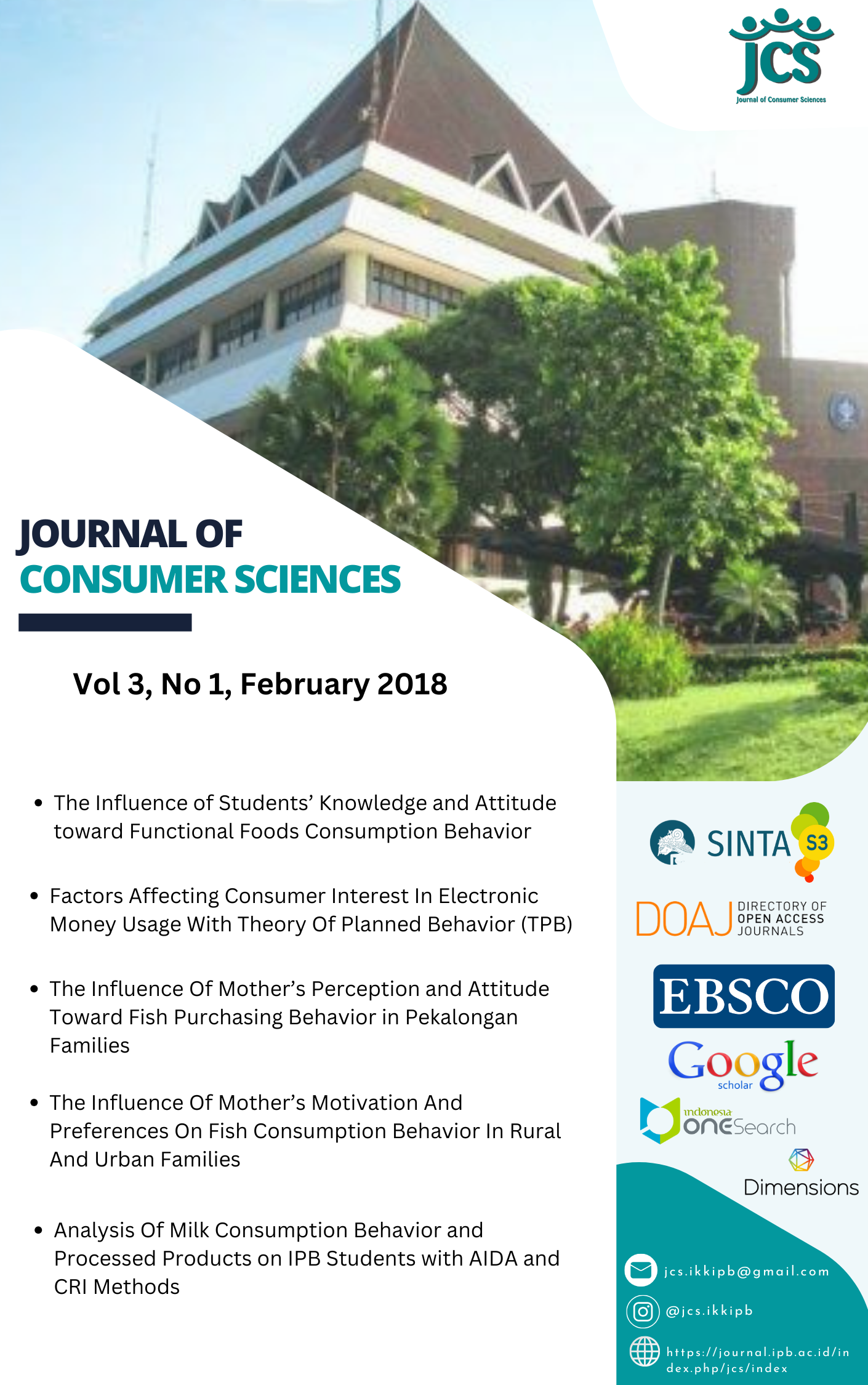The Influence of Students’ Knowledge and Attitude toward Functional Foods Consumption Behavior
Abstract
This research was to analyze the influence of students’ knowledge and attitude toward functional foods consumption behavior. This research used cross sectional study design and was conducted at Institut Pertanian Bogor, Dramaga. Samples in this research were 204 students of Institut Pertanian Bogor chosen using simple random sampling method. Data were collected by self-administered technique using questionnaires. The results showed that the average of functional foods consumption frequency was 47 times a month and the number of types consumed was seven. The results of Pearson correlation test showed that students’ allowance, attitudes, and frequency of functional foods consumption was significantly positively correlated. Factors that have significant positive effect toward consumption frequency are allowance and students’ attitude. The number of functional foods types consumed was influenced by students’ attitude.
References
[Depkes] Departemen Kesehatan Republik Indonesia. 2009. Profil kesehatan Indonesia 2008 [Internet]. [diunduh pada 2017 Juli 21]. Tersedia pada: www.depkes.go.id
Ares G dan Gambaro A. 2007. Influence of gender, age and motives underlying food choice on perceived healthiness and willingness to try functional foods. Appetite 49:148–158.
Beardsworth A, Bryman A, Keil T, Goode J, Haslam C, Lancashire E. 2002. Women, men and food: The significance of gender for nutritional attitudes and choices. British Food Journal 104(7):470-491.
Bech-Larsen T dan Grunert KG. 2003. The perceived healthiness of functional foods: a conjoint study of Danish, Finnish and American consumers’ perception of functional foods. Appetite 40(1):9-14.
Bogue J, Coleman T, Sorenson D. 2005. Determinants of consumer’s dietary behaviour for health-enhancing foods. British Food Journal 107(1):4-16.
Brečić R, Gorton M, Barjolle D. 2014. Understanding variations in the consumption of functional foods–evidence from Croatia, British Food Journal Vo116 (4):662 – 675.
Carrillo E, Fiszman S, Prado-Gasco V, Varela P. 2013. Why buying functional foods? Understanding spending behaviour through structural equation modeling. Food Research International 60(1):361-368.
Chen M. 2011. The joint moderating effect of health consciousness and healthy lifestyle on consumers’ willingness to use functional foods in Taiwan. Appetite 57(1):253-262.
De Jong N, Hoendervangers CT, Bleeker JK, Ocké MC. 2004. The opinion of Dutch dietitians about functional foods. Journal of Human Nutrition and Dietetics 17(1):55-62.
Dogan IS, Yildiz O, Eyduran E, Kose S. 2011. A study on determination of functional food consumption habits and awareness of consumers in Turkey. Bulgarian Journal of Agricultural Sciences 17 (2) : 246 - 257.
Florea L, Filip L, Banc R. 2016. Consumers’ knowledge, interest and attitude toward functional food in a Romanian population sample. Palestrica of the third millennium–Civilization and Sport 17(1):14–18.
Gilbert L. 2000. Marketing functional foods: how to reach your target audience. AgBioForum 3(1):20-38.
Krutulyte R, Costa AI, Grunert KG. 2009. A cross-cultural study of cereal food quality perception. Journal of Food Quality Perception 15(3): 304-323.
Marina T, Marija C, Ida R. 2014. Functional Foods and the Young. Journal of Food Products Marketings 20:441-451.
Menrad K. 2003. Market and marketing of functional food in Europe. Journal of Food Engineering 56(2):181-188.
Morawska A, Cocorna I, Boelawska I, Przyslawski J. 2016. The Nutritional Awareness of Functional Food Among University Students in Poland. Rocz Panstw Zakl Hig 67(2): 163-167.
Muctahdi D. 2012. Pangan Fungsional dan Senyawa Bioaktif. Bandung : Penerbit Alfabeta.
Ong FS, Kassim NM, Peng OS, Singh T. 2014. Purchase behaviour of consumer of functional foods in Malaysia: an analysis od selecteddemographic variables, attitude and health status. Asia Pacific Management Review 19(1):81-95.
Rezai G, Teng PK, Mohamed Z, Shamsudin MN. 2012. Functional food knowledge and perceptions among young consumers in Malaysia. International Journal of Social, Behavioral, Educational, Economic, Business, and Industrial Engineering 6(3): 307-312
Sääksjärvi M, Holmlund M, and Tanskanen N. 2009. Consumer knowledge of functional foods. The International Review of Retail, Distribution and Consumer Research 19 :135-156.
Schutza H, Spinksa J, Urala N. 2011. Consumer perceptions of “functional food” in the United States. Journal of Food Products Marketing 17(4):407-419.
Seechurn D, Neeliah H, Neeliah SA. 2009. Functional foods in mauritius: an exploratory survey. Journal of Developmental and Agricultural Economics 1(9): 204-211.
Siró I, Kápolna E, Kápolna B, Lugasi A. 2008. Functional food. Product development, marketing and consumer acceptance: A review. Appetite 51(3):456-467.
Sumarwan U. 2011. Perilaku Konsumen: Teori dan Penerapannya dalam Pemasaran. Bogor: Penerbit Ghalia Indonesia.
Urala N dan Lähteenmäki L. 2003. Reasons behind consumers’ functional food choices. Nutrition & Food Science 33:148-158.
______________________. 2007. Consumers´changing attitudes towards functional foods. Food Quality and Preference. 18(1):1-12.
Verbeke W. 2005. Consumer acceptance of functional foods: socio-demographic, cognitive and attitudinal determinants. Food Quality and Preference 16:45-57.
________ . 2005. Functional foods: Consumer willingness to compromise on taste for health? Food Quality and Preference 17:126–131.
Wansink B, R.E. Westgren, and M.M. Cheney. 2005. Hierarchy of nutritional knowledge that relates to the consumption of a functional food. Nutrition 21(2): 264-268.
Winarti, S. 2010. Makanan Fungsional. Jakarta: Penerbit Graha Ilmu.
Authors
Authors who publish with this journal agree to the following terms:
- Authors retain copyright and grant the journal right of first publication with the work simultaneously licensed under a

This work is licensed under a Creative Commons Attribution 4.0 International License. that allows others to share the work with an acknowledgement of the work's authorship and initial publication in this journal. - Authors are able to enter into separate, additional contractual arrangements for the non-exclusive distribution of the journal's published version of the work (e.g., post it to an institutional repository or publish it in a book), with an acknowledgement of its initial publication in this journal.
- Authors are permitted and encouraged to post their work online (e.g., in institutional repositories or on their website) prior to and during the submission process, as it can lead to productive exchanges, as well as earlier and greater citation of published work (See The Effect of Open Access).






